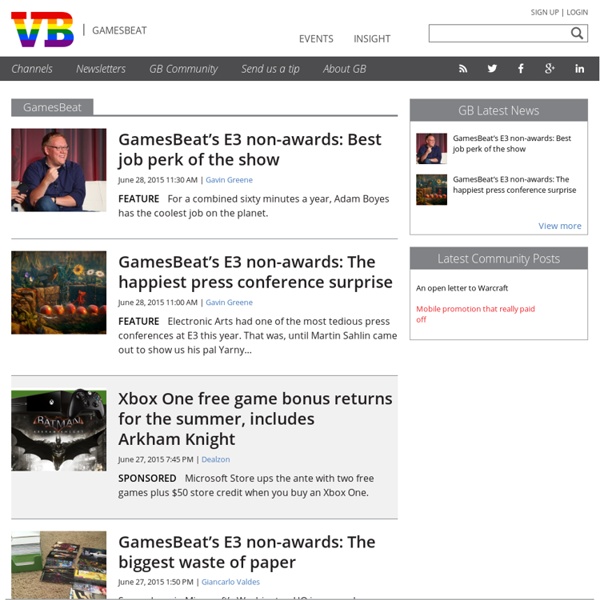



Home Product Manager HQ | A comprehensive resource for product managers The Magic Potion of Game Dynamics Michael Wu, Ph.D. is Lithium's Principal Scientist of Analytics, digging into the complex dynamics of social interaction and group behavior in online communities and social networks. Michael was voted a 2010 Influential Leader by CRM Magazine for his work on predictive social analytics and its application to Social CRM.He's a regular blogger on the Lithosphere's Building Community blog and previously wrote in the Analytic Science blog. When I kicked off this short-series on gaming last week I explained the various game related terminologies. Now we are ready to talk about the cool and interesting stuff. The Fogg Behavior Model The goal of game dynamics is to drive a user-desired behavior predictably. To understand game dynamics (and gaming mechanics), I will use a simple behavior model by Prof B. MotivationAbilityTrigger But the most important aspect of FBM is that all three factors must converge at the same time. Between Motivation and Ability Trigger is ALL about Timing Conclusion
Exclusive Interviews for The Games Industry - Gaming Insiders o Interviews Q&A: Yakuto Games Founder Jordan Kirk Much like Mediocre, the two-man studio behind Smash Hit and Does Not Commute, Yakuto Games is an indie studio that proves that you don’t need a lot of manpower to build a gorgeous mobile game. The three-person studio recently launched its first title, Table Tennis Touch. Q&A: Klei Entertainment Founder Jamie Cheng Before founding the Vancouver-based games studio Klei Entertainment, Jamie Cheng was an AI programmer on games like Warhammer 40,000K: Dawn of War, and The Outfit. Q&A: Quetzalcoatl Creator 1Button 1Button is a three-man indie studio whose many games (ON/OFF, Mr. Q&A: Lifeline Creator 3 Minute Games 3 Minute Games is a skunkworks-style studio that operates from within Big Fish Games’ Oakland office with the goal of making lots of games very quickly, testing them out in the marketplace, and seeing if it can discover new hits. Q&A: inkle Co-Founder Joseph Humfrey Q&A: Amazon Game Studios’s David Holmes Q&A: Big Huge Games CEO Tim Train
BJ Fogg's Behavior Model Gamasutra - The Art & Business of Making Games The Zappos Experience Essays on tech, growth, and startups at andrewchen The Power of the Prize They gave the world guns and butter -- specifically, the AK-47 and margarine. They sent Charles Lindbergh's The Spirit of St. Louis from New York to Paris and Burt Rutan's SpaceShipOne almost 70 miles above the earth -- twice. They are innovation prizes -- think, X Prize -- and from their origins in the Age of Discovery in the 1500s, they've come roaring back to life in recent years, with foundations, governments, and businesses alike rewarding fantastic achievements. But what's the real return on a prize? "We're looking for the next billion-dollar business," says David Hsieh, senior director of marketing at Cisco's Emerging Technologies Group. A contest broadcast outside a company can stimulate far more value than the cost to stage one. Karim R. In that spirit, Clear, which operates private passenger-security lanes at 13 airports to speed members through, announced a $500,000 prize last January for any technology or invention that will improve the process.
Can’t play, won’t play | Hide&Seek - Inventing new kinds of play I like neologisms. We need new words because we have new ideas, and ideas are the only things that break the law of the conservation of energy. Where once there was nothing there now is something, and the history of the neologism is a history of those moments of pure creation. ‘Gamification’, that said, can go take a long walk off a short pier. I’m heartened beyond measure to see that it’s been deleted from Wikipedia. ‘Gamification’, the internet will tell you, is the future. That problem being that gamification isn’t gamification at all. Games manage to produce all these drivers by being complex, responsive mechanisms. Games give their players meaningful choices that meaningfully impact on the world of the game. And living or dying is important. It’s crucial that we stop conflating points and games. Firstly, because it devalues points. But secondly, because it misrepresents games. Gamification is the wrong word for the right idea. So, in summary: Or, in other words:
Pawned. - coding conduct Pawned. Pawned. Gamification and Its Discontents. Presentation, Playful 2010, September 24, 2010, London, UK. Foursquare, Gowalla, Bunchball, Badgeville – it seems like the badge measles have taken over the Internet. This talk gives a brief tour through the »gamification« trend, to then insert some caveats, complications, unintended consequences, and hopefully, plain common sense. Short link: Note: This is more or less a companion piece to a previous talk where I point out the potential of games for interaction design: »Just add points? Persuasive Games: Exploitationware In the meantime, there's another lesson to learn from Frank Luntz: don't let the opposition set the terms of the debate. Instead, concoct better concepts with which to oppose them. In addition to his many verbal offensives, Luntz is also the architect of defensive phrases like "death tax," which invokes considerably more dissatisfaction than "estate tax." The latter phrase sounds like it applies to the wealthy (which, as a matter of fact, it does), but Luntz managed to help win much more mainstream support for its possible repeal by removing resentment about its association with wealth and replacing that resentment with disgust at the idea of being taxed just for dying. And more recently, Luntz has advocated that Republicans opposing Obama's health care reform by calling it a "Washington takeover" that will force citizens to "stand in line" for care. In particular, gamification proposes to replace real incentives with fictional ones. When seen in this light, "gamification" is a misnomer.